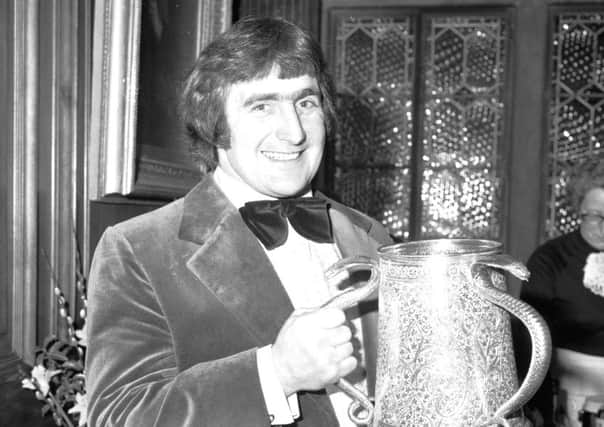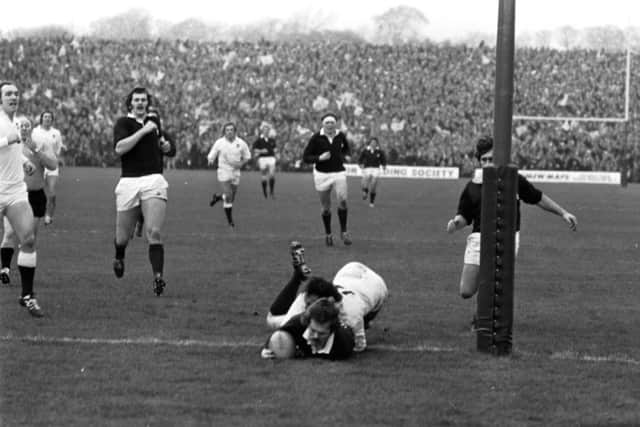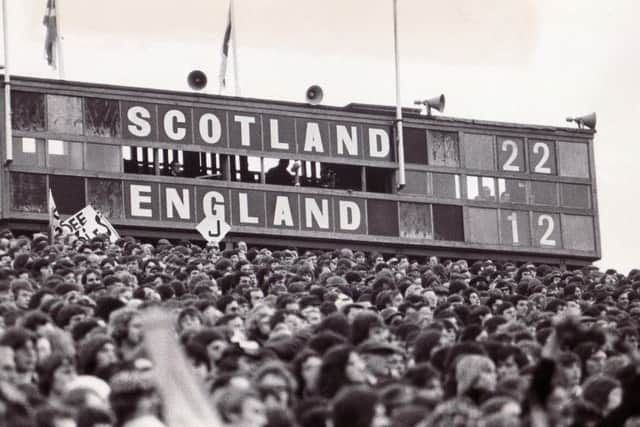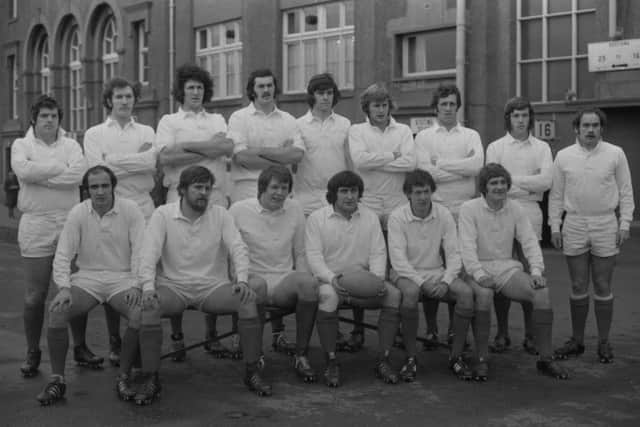The story of Scotland's famous 1976 Calcutta Cup win - part I


“Carmichael out to Tomes …Tomes out to Lawson … Lawson must score for Scotland … what a try!!” commentates Bill McLaren, somehow holding it together as his son-in-law outpaces England winger Ken Plummer to score a memorable try at the posts. McLaren’s commentary on such a dramatic score at an electric Murrayfield, the packed terraces erupting in celebration, will always be one of Scottish rugby’s greatest moments, capturing the 1970s era in all its Technicolor glory as the BBC turned traditional sporting rivalry into a gripping television drama.
It must have been a special occasion, because the Queen made a rare appearance at Murrayfield, accompanied by Prince Philip and son Prince Andrew.
Advertisement
Hide AdAdvertisement
Hide AdAs is often the case, the victory in 1976 was all the sweeter for Scotland because expectations were not high. This was the third round of matches in the Five Nations Championship, and a record of played two, lost two was far from encouraging. In their opening match, Scotland had gone down 13-6 to France at Murrayfield, ending a run of ten home wins. Nine missed kicks at goal shared between Dougie Morgan and


Andy Irvine didn’t help, although some of these were from long range and in windy conditions.
England had been looking for a fresh start after the disappointment of the previous season, when even a 7-6 win over Scotland in the last match of the campaign wasn’t enough to avoid landing the wooden spoon. If this year was to be any better for England, there was little evidence to suggest a revival would be witnessed any time soon as Wales dominated in a commanding 21-9 win at Twickenham. The only light relief for the home support on a grim afternoon for the hosts was provided by a policeman using his helmet to thwart a streaker’s exhibition.
After Scotland’s deflating start to the championship against France, fortunes took a distinct turn for the worse a fortnight later in Cardiff. Wales eased to a 28-6 victory, scoring three tries to one and leaving the hosts in the fortunate position of lamenting only that they had not played with more panache. “Crushing but not poetic” was the verdict of former Welsh captain Clem Thomas.
For the record, the Welsh tries were scored by JJ Williams, Trevor Evans and Gareth Edwards, with Steve Fenwick adding a drop goal and Phil Bennett two conversions and three penalties. Andy Irvine’s try for Scotland was converted by Morgan.


It was such a wretched afternoon that much of the criticism in the match report carried in The Scotsman – constructive criticism, it must be said - landed with three players who would become legends of Scottish rugby, namely David Leslie, Ian McGeechan and Andy Irvine.
“David Leslie, as always, played with much dash,” reported the respected and acclaimed rugby writer Norman Mair, “but the angle of his approach in offensive-defence still too frequently found him left for dead, while both his failure to clear after a very good piece of fielding under his own posts and the ease with which he was trapped offside were lapses of which so refreshingly self-critical a player will not be proud.”
Advertisement
Hide AdAdvertisement
Hide AdMcGeechan “was concerned in two instances of downright bad rugby grammar” while Irvine “took his try splendidly … but what is so maddening is that he still so invites trouble by bad technique.”
Continued Mair: “Still only 24, Irvine could yet learn – but how he hasn’t already done so, what with all the modern coaching and a full Lions tour, I can’t imagine. It is all the more infuriating in that he has been so richly endowed with so many of the assets you can’t be taught or artificially acquire – gifts of acceleration, pace and elusiveness.”


These were depressing assessments of talented players, and the mood was a mark of how far spirits had fallen in a very short time. The previous year, only single-point defeats in Paris and at Twickenham had been the difference between second place and a first Scottish grand slam in 50 years. And it was only two months since Australia had been beaten at Murrayfield, and the annual trial match at the turn of the year had featured two sides peppered with international class players, but two defeats out of two was a fair reflection of where the team now found itself.
Alastair McHarg added to the SRU’s headache by flouting a recent edict that the Union would not tolerate foul play, throwing several punches during the match including two which provoked the ire of the home crowd as he thumped Bennett on the head at a ruck. Mercifully for McHarg, the referee did not send him off, and the London Scot turned in his best game of the season which made it difficult for the selectors to drop him.
Others in the Scotland camp would come under the microscope later that week. England, meantime, had the weekend off, and would take heart from seeing their next opponents suffer a further blow to morale. But they had little reason to travel north with confidence. England had not won in Edinburgh since 1968, and had lost four games on the bounce at Murrayfield.
Form may have deserted the hosts of that year’s Calcutta Cup match, but history and home advantage remained on Scotland’s side…
TOMORROW: Part 2 - Scotland spring a surprise in team to face Auld Enemy